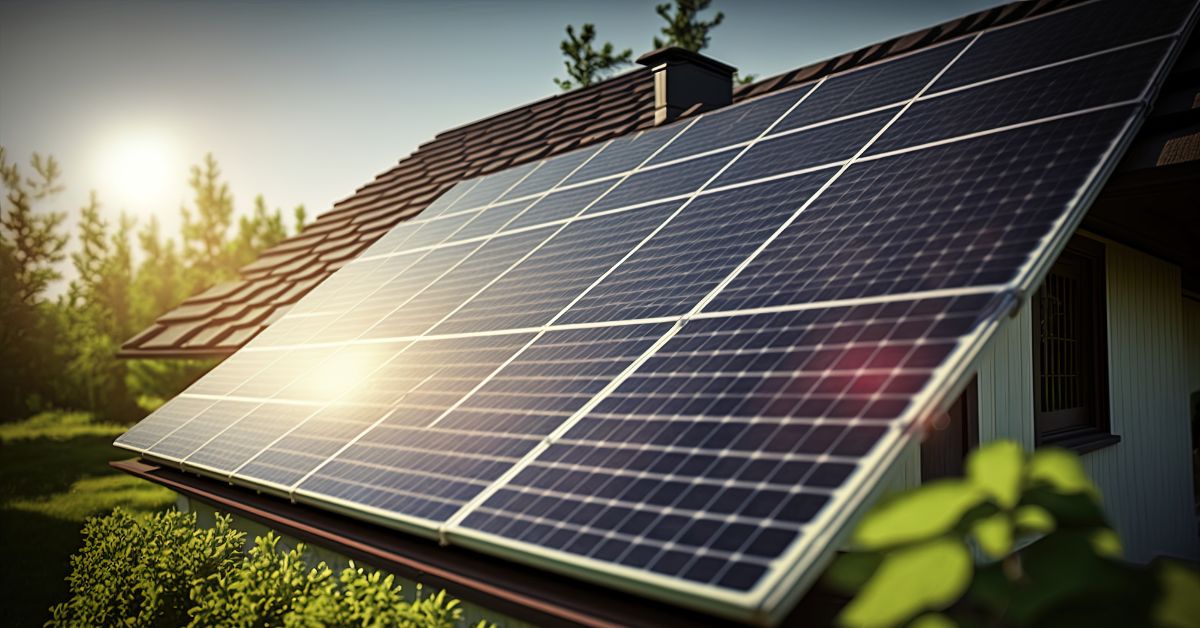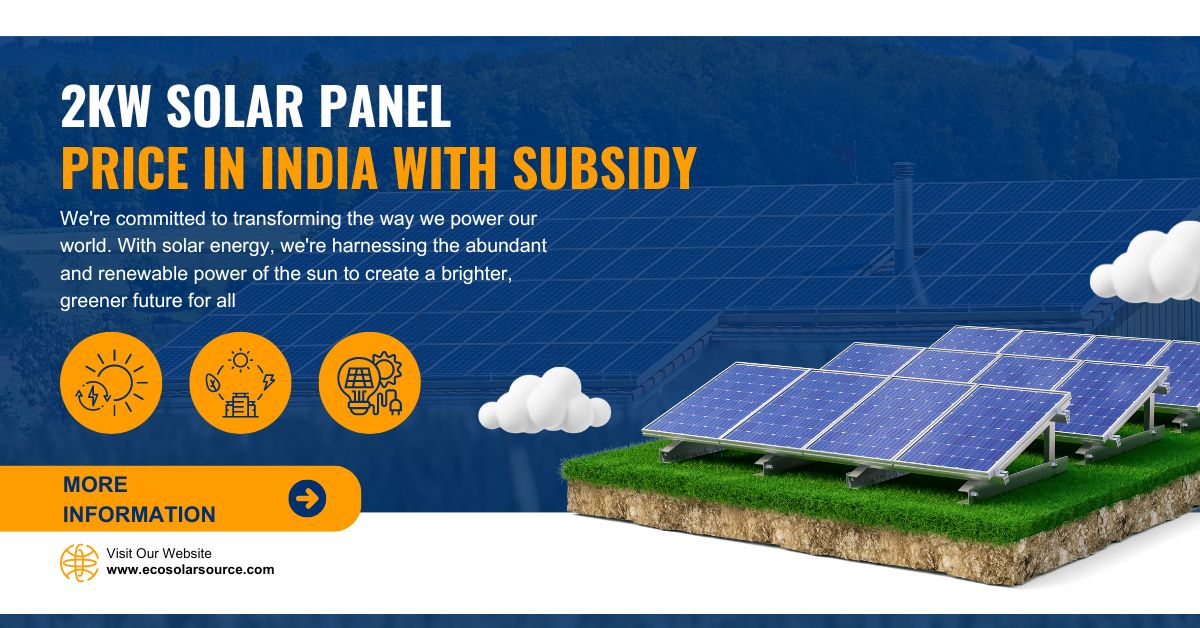2kW Solar Panel Price in India With Subsidy
The 2kW Solar Panel Price in India With Subsidy, with government subsidies, typically ranges from ₹50,000 to ₹1,00,000. Subsidies can significantly lower upfront costs, making solar energy more accessible for residential and small commercial users.
The exact price depends on factors such as panel quality, installation fees, and location. Government initiatives like the PM-KUSUM scheme offer up to 40% subsidy for residential users, promoting sustainable energy adoption. A 2kW system is ideal for households with moderate energy needs, generating around 8-10 kWh of electricity daily, reducing electricity bills and environmental impact over time.
Table of Contents
2kW Solar Panel Price in India with Subsidy: A Comprehensive Guide
With the growing demand for renewable energy, especially in a country like India, where solar potential is vast, solar panels have become a popular solution for sustainable energy. A 2kW solar system is ideal for small homes, offices, and even commercial establishments, making it a popular choice for households across India. The Indian government’s push for renewable energy adoption has also made solar installations more affordable by offering subsidies to reduce the upfront cost.
In this comprehensive guide, we will delve deep into the details of the 2kW solar panel price in India, the various components involved, government subsidies, benefits, and factors influencing the cost. By the end, you’ll have a thorough understanding of the investment required and the long-term savings and benefits associated with installing a 2kW solar power system.
Understanding a 2kW Solar System
A 2kW solar system consists of solar panels capable of generating 2000 watts (2 kilowatts) of electricity under ideal conditions. It is suitable for small to medium-sized homes, typically consuming around 6 to 8 units of electricity per day. A 2kW system can produce around 8-10 kWh of energy daily, depending on location, weather conditions, and other factors.

This system size is a popular option for those looking to reduce their dependence on grid electricity and reduce monthly electricity bills.
Components of a 2kW Solar Power System
Before understanding the cost, it’s essential to know the main components that make up a 2kW solar system:
- Solar Panels: The solar photovoltaic (PV) panels are the primary component that converts sunlight into electricity. Typically, a 2kW system will consist of 6-7 panels, with each panel rated between 320-400W.
- Inverter: The inverter converts the direct current (DC) generated by the solar panels into alternating current (AC) that can be used by home appliances.
- Mounting Structure: The structure used to mount solar panels on your rooftop or open space, which ensures optimal tilt and angle for maximum solar exposure.
- Batteries (for Off-Grid Systems): If you choose an off-grid solar system, batteries are required to store excess energy generated during the day for use at night.
- Balance of System (BoS): This includes wiring, switches, junction boxes, connectors, and protection devices.
- Installation and Maintenance: The cost of installing the system and any ongoing maintenance.
Price of 2kW Solar Panel in India (2024)
The price of a 2kW solar system varies depending on several factors such as quality of components, type of system (on-grid or off-grid), installation costs, and location. As of 2024, the general price range for a 2kW system in India is as follows:
On-Grid Solar System Price:
- Price Range: ₹1,10,000 to ₹1,30,000
- An on-grid system is connected to the main electricity grid. Excess electricity generated is exported to the grid, and homeowners get credited for the electricity they contribute.
Off-Grid Solar System Price:
- Price Range: ₹1,40,000 to ₹1,60,000
- Off-grid systems are independent of the grid and come with batteries to store excess energy. These systems are more expensive due to the inclusion of batteries.
Hybrid Solar System Price:
- Price Range: ₹1,70,000 to ₹1,90,000
- A hybrid system combines the benefits of both on-grid and off-grid. It allows you to store electricity in batteries while remaining connected to the grid.
Government Subsidies on Solar Panels in India
The Government of India has taken significant steps to promote solar energy adoption. Through the Ministry of New and Renewable Energy (MNRE), the government offers subsidies for residential solar installations, making them affordable for homeowners.
Eligibility for Subsidy
- The subsidy is available only for residential users installing solar power systems.
- Only grid-connected rooftop solar systems qualify for subsidies. Off-grid systems do not receive the government subsidy.
- The installation must be done by MNRE-approved vendors and adhere to government specifications and standards.
How Much Subsidy Can You Get?
As per MNRE’s guidelines, the subsidy percentage is based on the capacity of the solar system. Below are the current subsidy rates (which may vary slightly based on the state or changes in government policies):
- For systems up to 3kW: 40% subsidy
- For systems from 3kW to 10kW: 20% subsidy
- No subsidy for systems above 10kW
For a 2kW system, you can avail 40% subsidy.
Example of Price with Subsidy for a 2kW On-Grid Solar System:
- Cost without Subsidy: ₹1,20,000
- Government Subsidy (40%): ₹48,000
- Final Cost After Subsidy: ₹72,000
This significant reduction in upfront costs makes solar installations much more affordable for homeowners across India.
Factors Influencing the Price of a 2kW Solar System
Several factors can influence the price of a 2kW solar system in India. It’s essential to consider these elements when calculating your overall investment:

- Quality of Solar Panels: The type and efficiency of solar panels play a major role in determining the price. High-efficiency panels (like monocrystalline panels) cost more but provide better energy output compared to polycrystalline panels.
- Type of System: On-grid systems are generally cheaper compared to off-grid systems due to the absence of batteries. Hybrid systems, combining both, tend to be more expensive.
- Brand and Manufacturer: The brand and reputation of the solar panel manufacturer also influence the price. Established brands often charge more, but their products are generally more reliable.
- Location: Solar panel performance can vary based on geographic location. Areas receiving more sunlight will require fewer panels, while regions with less sunlight may need additional panels to generate the same amount of energy, affecting the cost.
- Installation Costs: Installation costs vary by region, the complexity of the installation, and labor charges. Rooftop installations may be more challenging depending on the roof type, requiring additional structures, which can increase costs.
- Subsidies and Incentives: Government subsidies significantly reduce the initial investment, but their availability and amount may vary by state or local regulations.
Benefits of Installing a 2kW Solar System
Now that you understand the cost and subsidy structure, let’s look at the key benefits of installing a 2kW solar system:
1. Reduced Electricity Bills
A 2kW solar system can generate 8-10 kWh of electricity per day, which can cover the energy needs of a small home. By generating your electricity, you can drastically reduce or even eliminate your electricity bills. Any excess energy generated can be exported back to the grid (in on-grid systems), further offsetting your expenses.
2. Environmentally Friendly
Solar energy is clean, green, and renewable. By switching to solar power, you reduce your carbon footprint and contribute to the fight against climate change. A 2kW solar system can offset approximately 3-4 tonnes of CO2 emissions annually, making it an eco-friendly choice.
3. Energy Independence
With an off-grid or hybrid solar system, you are no longer reliant on grid electricity. This is particularly beneficial in areas prone to power cuts or for homeowners who want to reduce their dependence on conventional energy sources.
4. Low Maintenance
Solar systems require minimal maintenance. Solar panels come with long warranties (20-25 years), and regular cleaning ensures optimal performance. The inverter may need replacement after 8-10 years, but overall, maintenance costs are low.
5. Increase in Property Value
Installing a solar system can increase the value of your property. Prospective buyers are often willing to pay a premium for homes with solar systems due to the long-term savings on electricity and environmental benefits.
6. Government Subsidies and Incentives
With government support in the form of subsidies and net metering policies, the initial cost of installing a solar system is significantly reduced. This makes solar energy an attractive and viable option for Indian households.
Savings and Payback Period for a 2kW Solar System
A 2kW solar system is an investment that pays off over time. With reduced electricity bills and government subsidies, the payback period for the system is generally between 4 to 5 years.
Let’s break down the savings:
- Monthly Savings: A 2kW system can save you between ₹2,000 to ₹3,000 per month, depending on your electricity consumption and tariff rates.
- Yearly Savings: This translates to annual savings of ₹24,000 to ₹36,000.
- Total Savings Over 25 Years: Given the 25-year lifespan of solar panels, the total savings can range between ₹6,00,000 and ₹9,00,000 over the system’s lifetime.
FAQs About 2kW Solar Panel Price in India With Subsidy
Q1. Can I run my entire household on a 2kW solar system?
A 2kW system can cover the basic electricity needs of a small household, such as lighting, fans, and small appliances. However, larger households with higher energy consumption may need a bigger system.
Q2. What is the average lifespan of a solar system?
Solar panels generally have a lifespan of 25 years, while inverters last around 8-10 years before requiring replacement.
Q3. Solar panels maintenance-intensive?
No, solar panels require very little maintenance. Regular cleaning and an occasional professional check-up are usually sufficient.
Q4. How can I apply for the government solar subsidy?
You can apply for the subsidy through MNRE-approved vendors and installers. They will guide you through the process of applying for the subsidy.
Q5. What if I generate more electricity than I use?
If you have an on-grid system, excess electricity can be exported back to the grid, and you will receive credits on your electricity bill through net metering.
Q6. What is the approximate cost of a 2kW solar panel system in India with government subsidies?
The cost of a 2kW solar panel system in India can range from ₹1.2 to ₹1.6 lakhs before subsidies. With government subsidies, the price could reduce by 20-40%, bringing the final cost down to approximately ₹80,000 – ₹1 lakh, depending on the state.
Q7. How much subsidy does the Indian government provide for installing a 2kW solar panel system?
The Indian government offers subsidies ranging from 20% to 40% of the total system cost, depending on the state, the capacity of the system, and the type of installation (residential or institutional).
Q8. What factors influence the final price of a 2kW solar panel system in India?
Factors such as the brand of solar panels, type of inverter (grid-tied or off-grid), mounting structures, batteries (if included), installation charges, and state-specific subsidies all affect the final price of the solar system.
Q9. Are there any additional charges for installation or maintenance after buying a subsidized 2kW solar system?
Yes, installation charges may apply, which can range from ₹10,000 to ₹20,000. Maintenance is generally low, but periodic cleaning of panels and inverter checks may incur additional costs.
Q10. How long does it take to recover the investment in a 2kW solar system with subsidies?
On average, the payback period for a 2kW solar system with subsidies is around 4 to 5 years, depending on electricity consumption and state-specific tariffs.
Q11. What are the eligibility criteria for availing subsidies on solar panels in India?
Subsidies are available for residential, institutional, and some commercial properties. The applicant must install the system through an approved vendor and meet the state’s renewable energy department’s criteria.
Q12. How much electricity does a 2kW solar panel system generate daily, and how much can I save on my electricity bills?
A 2kW system typically generates 8-10 kWh (units) of electricity per day. The amount saved depends on your electricity consumption, but it can reduce your monthly bill by ₹1,500 to ₹2,500.
Q13. What is the lifespan of a 2kW solar panel system, and will the subsidy affect the warranty?
Solar panels generally have a lifespan of 25 years, while inverters last around 5 to 10 years. Government subsidies do not affect the manufacturer’s warranty or service agreements.
Q14. Can I upgrade my solar system after installing a 2kW setup with subsidies?
Yes, solar systems are scalable. You can add more panels or upgrade the inverter later, but the subsidy applies only to the initial installation. Any upgrades will not be eligible for the same subsidy.
Q15. Are batteries included in the price of a 2kW solar system with subsidies, and are they necessary?
Most grid-tied solar systems do not include batteries, as they rely on the grid for backup. However, if you opt for an off-grid or hybrid system with batteries, the cost will increase significantly, and the subsidy may not cover battery costs.
Conclusion: Is a 2kW Solar System Worth the Investment?
A 2kW solar system is an excellent investment for homeowners looking to reduce their electricity bills and contribute to a greener future. The system is ideal for small to medium households, and with the government subsidy, the upfront cost becomes much more manageable. The long-term savings, coupled with the low maintenance requirements, make it a financially sound decision.

By taking advantage of government incentives and selecting the right type of system for your needs, you can achieve energy independence and enjoy a cleaner, greener lifestyle. The combination of financial savings, environmental benefits, and rising electricity costs in India makes a 2kW solar system a smart choice for the future.
If you’re considering installing a 2kW solar system, now is the time to act. With ever-improving solar technology and increasing government support, the benefits of going solar far outweigh the initial investment. Embrace renewable energy today, and enjoy the benefits for years to come.
A 2kW solar system can be a worthwhile investment for many homeowners, especially in regions with abundant sunlight and rising electricity costs. It offers long-term savings on energy bills, reduces carbon footprints, and increases property value. While the initial costs may seem significant, government incentives and financing options can alleviate financial burdens.
Additionally, advancements in solar technology enhance efficiency and performance. However, individual circumstances, such as energy consumption patterns and local regulations, should be carefully evaluated. Ultimately, a 2kW solar system not only supports sustainable living but also provides a solid return on investment over time.
Click here to learn more about the 2kW Solar Panel Price in India With Subsidy
Click here to learn more about Solar Panel System Subsidy in Madhya Pradesh

